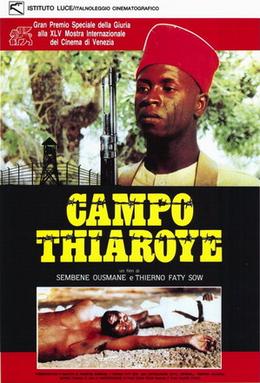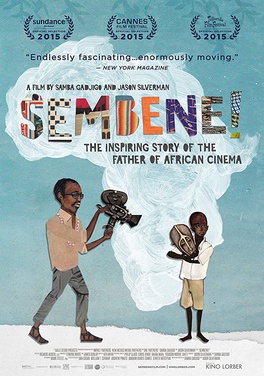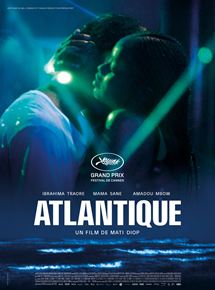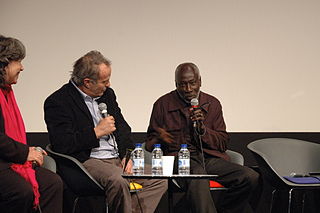Related Research Articles

Ousmane Sembène, often credited in the French style as Sembène Ousmane which he seemed to favor as a way to underscore the "colonial imposition" of this naming ritual and subvert it, was a Senegalese film director, producer and writer. The Los Angeles Times considered him one of the greatest authors of Africa and he has often been called the "father of African film". Descended from a Serer family through his mother from the line of Matar Sène, Ousmane Sembène was particularly drawn to Serer religious festivals especially the Tuur festival.

Cinema of Africa covers both the history and present of the making or screening of films on the African continent, and also refers to the persons involved in this form of audiovisual culture. It dates back to the early 20th century, when film reels were the primary cinematic technology in use. During the colonial era, African life was shown only by the work of white, colonial, Western filmmakers, who depicted Africans in a negative fashion, as exotic "others". As there are more than 50 countries with audiovisual traditions, there is no one single 'African cinema'. Both historically and culturally, there are major regional differences between North African and sub-Saharan cinemas, and between the cinemas of different countries.

Djibril Diop Mambéty was a Senegalese film director, actor, orator, composer and poet. Though he made only two feature films and five short films, they received international acclaim for their original and experimental cinematic technique and non-linear, unconventional narrative style.

Mark Semyonovich Donskoy was a Soviet film director, screenwriter, and studio administrative head.
Borom Sarret or The Wagoner is a 1963 film by Senegalese director Ousmane Sembène, the first film over which he had full control. It is often called the first film made in Africa by an African; the first "professional" African film; or the first such film to be shown widely outside of Africa. However, this is disputed, with some other films, such as Song of Khartoum, Sarzan, and Mouramani having arguably been produced earlier. Thus, some authors refer to it as "among the first" films made in Africa by an African filmmaker. Borom Sarret is 18 minutes long and tells a story about a cart driver in Dakar. The film illustrates the poverty in Africa, showing that independence has not solved the problems of its people. It was shown as part of the Cannes Classics section of the 2013 Cannes Film Festival.

Mandabi is a 1968 film written and directed by Senegalese filmmaker Ousmane Sembène. The film is based on Sembène's novel The Money-Order and is the director's first film in his native Wolof language. Since most of the Senegalese population do not understand French, Sembène wanted to create cinema for Wolof speakers. This is believed to be the first full-length African language film from West Africa.
Ben Diogaye Bèye is a Senegalese filmwriter, filmmaker, film producer and journalist. He was the assistant director of nearly a dozen Senegalese films, including Touki Bouki with Djibril Diop Mambety, Baks with Momar Thiam, Sarah et Marjama with Axel Lohman, and the co-screenwriter of the latter two.

The cinema of Senegal is a relatively small film industry which experienced its prime from the 1960s through to the early 1980s, but has since declined to less than five feature films produced in the last ten years. Senegal is the capital of African cinema and the most important place of African film production after its independence from France in 1960.

Senegalese literature is written or literary work which has been produced by writers born in the West African state. Senegalese literary works are mostly written in French, the language of the colonial administration. However, there are many instances of works being written in Arabic and the native languages of Wolof, Pulaar, Mandinka, Diola, Soninke and Serer. Oral traditions, in the form of Griot storytellers, constitute a historical element of the Senegalese canon and have persisted as cultural custodians throughout the nation's history. A form of proto-Senegalese literature arose during the mid 19th century with the works of David Abbé Boilat, who produced written ethnographic literature which supported French Colonial rule. This genre of Senegalese literature continued to expand during the 1920s with the works of Bakary Diallo and Ahmadou Mapaté Diagne. Earlier literary examples exist in the form of Qur’anic texts which led to the growth of a form African linguistic expressionism using the Arabic alphabet, known as Ajami. Poets of this genre include Ahmad Ayan Sih and Dhu al-nun.

Badou Boy is a 1970 Senegalese short film, directed by Djibril Diop Mambéty. The film follows the adventures of Badou Boy, a cheeky young man, as he travels through the streets of Dakar on the city buses.
Guelwaar is a 1993 French-Senegalese drama film written and directed by Ousmane Sembène. The name is borrowed from the Serer pre-colonial dynasty of Guelowar. The film won The President of the Italian Senate's Gold Medal at the 49th Venice International Film Festival.

The Pirogue is a 2012 Senegalese drama film directed by Moussa Touré. The film follows a fisherman, Baya Leye, sailing a group of Senegalese immigrants sailing to Spain. The film competed in the Un Certain Regard section at the 2012 Cannes Film Festival.

Camp de Thiaroye is a 1988 Senegalese war-drama film written and directed by Ousmane Sembène and Thierno Faty Sow.

Sembene! is a 2015 documentary film focusing on the life of Senegalese filmmaker Ousmane Sembène, who is considered to be the father of African cinema. It is co-directed by Samba Gadjigo and Jason Silverman. The film's world premiere took place at the Sundance Film Festival in January 2015. It also played at the Cannes Film Festival and the Venice Film Festival.

Atlantics is a 2019 internationally co-produced supernatural romantic drama film directed by Mati Diop, in her feature directorial debut. It was selected to compete for the Palme d'Or at the 2019 Cannes Film Festival. Diop made history when the film premiered at Cannes, becoming the first Black woman to direct a film featured in competition at the festival.
Ousmane William Mbaye, is a Senegalese filmmaker. Mbaye is best known as the director of the critically acclaim documentary Mère-Bi and films Doomi Ngacc, Fresque and Kemtiyu, Cheikh Anta. Apart from filmmaking, he is also an executive producer, line producer, screenwriter, foreign producer, director of photography, sound recordist, production manager, editor, and producer.
Diankou Sembene, is a Sénégalese actor. He is best known for the role as 'Mr. Ndiaye' in the supernatural romantic drama film Atlantics.

Samba Félix N’diaye, was a Sénégalese filmmaker. One of the early pillars in Senegalese cinema industry, Ndiaye is regarded as the father of the African documentary. He made several critically acclaimed Documentary shorts Trésors des poubelles, Ngor, l'esprit des lieux, Les malles and Geti Tey. Apart from direction, he is also a writer and cinematographer.
Younousse Sèye is a Senegalese artist and actress. Considered Senegal's first woman painter, she is best known for her mixed-media works incorporating cowrie shells. Having no formal training in either visual art or acting, she achieved success in the post-independence Dakar art scene and appeared in several major films by the Senegalese director Ousmane Sembène.
Thierno Faty Sow was a Senegalese filmmaker, screenwriter and actor.
References
- 1 2 3 "Samba Gadjigo: Helen Day Gould Professor of French". mtholyoke. Retrieved 30 October 2020.
- 1 2 "Gadjigo's film, "a voice and vision for Africa."". mtholyoke. Retrieved 30 October 2020.
- ↑ "Film Screening: SEMBENE! The Inspiring Story of the Father of African Cinema with Director Samba Gadjigo". stanford. Retrieved 30 October 2020.
- ↑ "SAMBA GADJIGO – WE ARE MADE OF STORIES". radioplasma. Retrieved 30 October 2020.
- ↑ "Rotten Tomatoes".
- ↑ Bilge Ebiri. "Bilge Ebiri's Top 10 Movies of 2015". Vulture.
- ↑ "Professor's film recognized internationally". mtholyoke. Retrieved 30 October 2020.
- ↑ "Professor's film to screen at Cannes Festival". mtholyoke. Retrieved 30 October 2020.
- ↑ "Four MHC professors receive faculty awards". mtholyoke. Retrieved 30 October 2020.